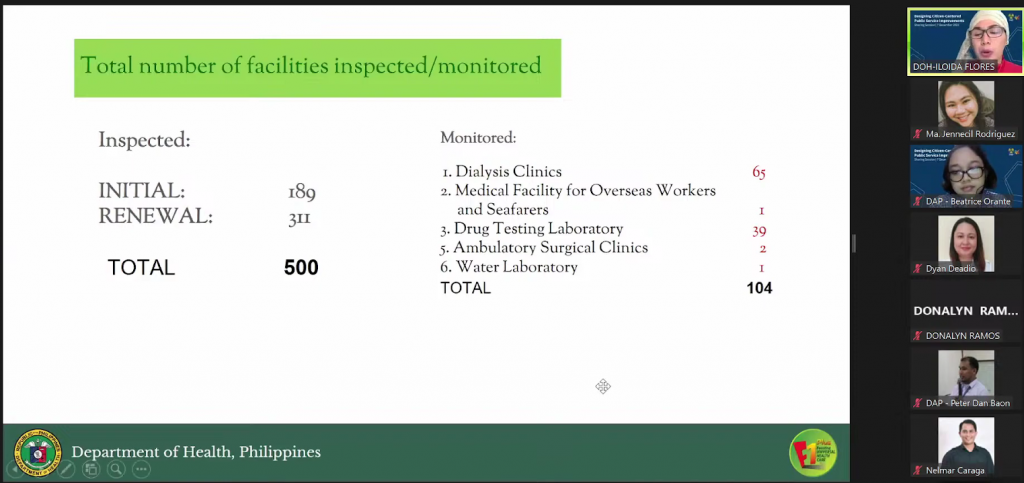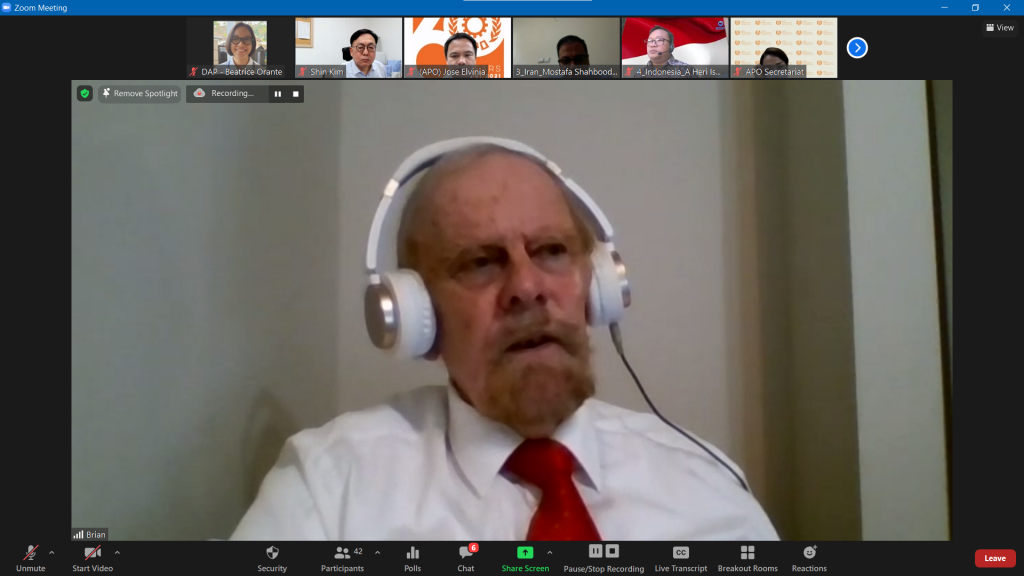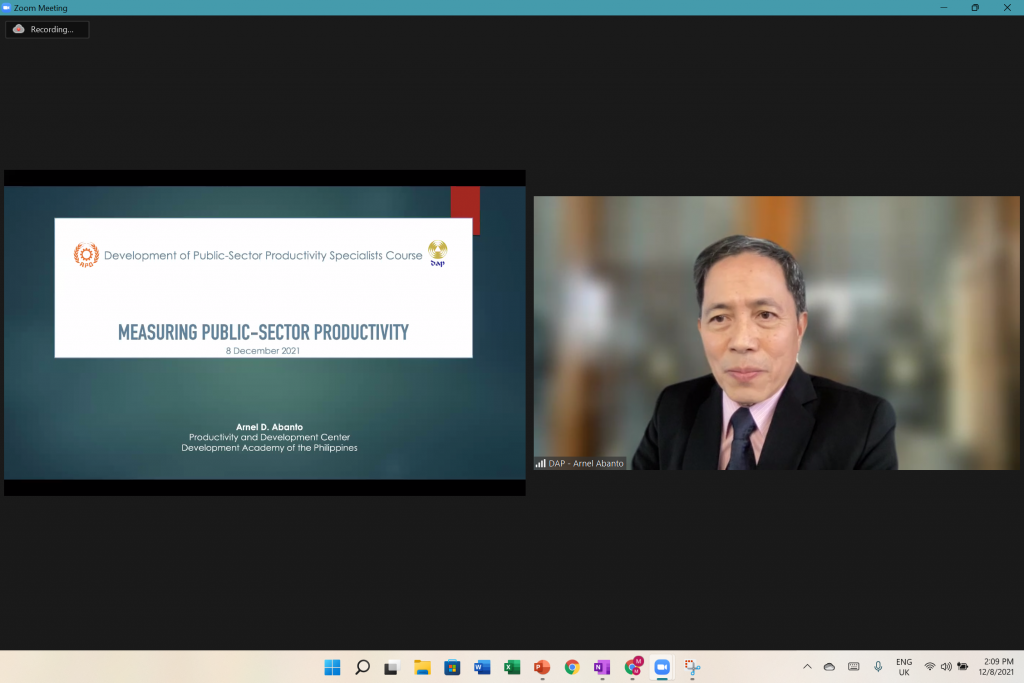The Development Academy of the Philippines (DAP), in cooperation with the Asian Productivity Organization (APO), through the Center of Excellence on Public Sector Productivity (COE-PSP) Program Management Office, implemented this year’s first run of the APO Development of Public Sector Productivity Specialists (APO DPSPS).
The course was conducted online and ran from 16 to 20 May 2022. It was attended by 50 participants from APO member countries such as Indonesia, the Islamic Republic of Iran, Mongolia, Nepal, Pakistan, the Republic of China, Singapore, Sri Lanka, Thailand, Turkey, and the Philippines. It trained the participants in the relevant concepts, approaches, tools, and techniques to develop their competencies as productivity specialists in the public sector.
The course predominantly featured Dr. Shin Kim, Senior Research Fellow with the Division of Regulatory Innovation Research, Korea Institute of Public Administration, Republic of Korea, and Dr. D. Brian Marson, President of the Public Service Excellence Institute, Canada, as its two main speakers. They were supported by presentations from DAP officers Mr. Arnel D. Abanto, Vice President and Managing Director of the Productivity and Development Center, and Ms. Maria Rosario A. Ablan, Program Director of the AO 25 Secretariat, as well as case presentations from key Philippine government officials.
Productivity Trends and Concepts
The opening day began with a message from National Economic Development Authority (NEDA) Undersecretary Jose Miguel de la Rosa, the APO Director for the Philippines, who emphasized the need for more individuals capable of transforming the public sector to become more innovative, agile, and impactful. This was followed by the first session of the course, The Role of the Public Sector and Global Trends in Improving Productivity, in which Dr. Kim discussed the importance of productivity in governance. This was further enriched by the day’s final session on Public Sector Leadership. Dr. Marson used this session to clarify the differences between leadership and management, especially in the context of the public sector, and how each can contribute to productivity.
Dr. Marson opened the following day’s sessions, beginning with the topic Citizen-Centered Service and Opportunities for Improving Public Service Delivery in the New Normal. Much of the discussion revolved around the experiences of the Philippines, Singapore, New Zealand, and Canada in measuring client satisfaction with government services and addressing the gaps and problems that were highlighted by the public.
Dr. Kim followed with a session on Performance Management, particularly on its relation to productivity, accountability, and, ultimately, results. One of his insights was that, in the past, organizations approached this by first thinking about how to manage their resources. But now, the thinking has shifted to first identifying goals and objectives before determining the required actions and resources.
To close the day’s sessions, Dr. Marson facilitated a group exercise on citizen-centered services. Participants were divided into four groups to brainstorm service improvement plans based on their group’s assigned case study. Afterwards, each group’s representative presented their findings and discussed with the larger group.
Assessing, Measuring, and Improving Productivity
The third day of the course opened with the session on Development of Productivity Improvement Plans, where Dr. Marson discussed the key steps needed to devise an initiative that would increase an organization’s productivity in a systematic way. These include conducting baseline performance assessments, establishing clear objectives, and selecting the appropriate components that would ensure the effectiveness and quality of the resulting action. He highlighted the use of the Common Assessment Framework (CAF) as a basis for developing a thorough and well-executed improvement plan.
The next session, Measuring Public Sector Productivity, was covered by Mr. Abanto, who began by discussing the key considerations in estimating public sector productivity, such as the effective communication of productivity information for policy, decision-making, and improvement action. He then proceeded to demonstrate index-based productivity measurement, highlighting the use of cost-weighing and deflating to ensure the accuracy of the resulting productivity estimates.
Dr. Marson led the fourth day of sessions with his discussion of Change Management in the Public Sector. This particular session included mini-case studies and group discussions on theories of and best practices in change management specific to the public sector. The participants’ questions centered on the change management process, its challenges, and the solutions needed to overcome the said challenges.
The following topic, Approaches for Improving Organizational Productivity, was covered by Ms. Ablan. She discussed a range of practical tools and techniques to improve productivity such as the 5S Methodology or Practical Industrial Engineering (IE). She also highlighted the importance of understanding the underlying principles in choosing the right tools and techniques and employing the appropriate solutions for the problems at hand.
The Application of Technology in Public Sector Productivity
The last day of the course began with two presentations of local projects showcasing how their initiatives and leadership strategies concretized the concepts and tools of productivity, particularly in the use of digital technology.
First to present was Ms. Maria Luisa Khristina C. Oliveros, Supervising Labor and Employment Officer for the Department of Labor and Employment (DOLE) CAMANAVA Field Office. She demonstrated how her project on virtual site inspections proved to be a safe means of conducting labor inspections, especially given the difficulties brought by COVID-19.
Second was Dr. Edward E. Baña, Education Program Supervisor for the Department of Education Schools Division Office of Antique. He presented how his project on using RFID technology for student monitoring helped prevent children from dropping out and also provided more efficient workflows for the school’s employees.
These presentations flowed directly into the final session of the course, which was on the topic of E-Government. Dr. Kim discussed how best to understand the concept of e-government, and showcased some best practices in the use of ICT across different public sector cases from various countries.
To formally close the five-day training, APO Alternate Director for the Philippines and DAP President and CEO Atty. Engelbert C. Caronan, Jr., delivered a message that thanked the APO and DAP teams for their efforts in hosting the course and commended the resource persons for sharing their knowledge and guiding the participants. He added that he is looking forward to the innovations that the participants will implement to help public sector organizations improve their productivity.










